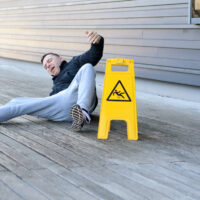Can You Recover Compensation From a Slip and Fall With a Warning Sign?

If you slip and fall or trip and fall on someone else’s property, you could be entitled to compensation for your medical bills, pain and suffering, and other damages. Property owners or operators have a responsibility to keep their premises safe for visitors and guests. When they shirk that responsibility, and someone gets hurt, the injured victim has the right to seek compensation for the harm they suffered. If the property owner had put up a warning sign, however, does that absolve them of liability? If you were seriously hurt in a slip and fall but afterward you notice there was a “wet floor” sign, should you give up on your claims? The answer is, as always: it depends. Read on to learn how warning signs affect property owner liability, and if you’ve been hurt in a slip and fall accident in New York City, call a knowledgeable NYC premises liability attorney for advice and assistance.
Property Owner Duties: Remedy Hazards or Adequately Warn
Slip and fall claims, like other premises liability claims, are based on showing that the property owner had a duty to the plaintiff (the injury victim), they breached that duty, and that breach caused an injury. Owners of property open to the public, such as grocery stores, are required to keep their premises safe for customers.
If a spill caused a wet floor, for example, the store has a duty to either clean up the store or adequately warn the customers of the spill. Store owners must act within a reasonable amount of time–if the spill happened 30 seconds before someone slipped, it’s hard to claim it’s the store’s fault unless the spill was caused by a store employee. If the spill was caused by an employee, or the spill was left unattended for several minutes before the customer slipped, then it’s reasonable to say the store should have acted.
Property owners have two options with regard to hazards: Fix the hazard (clean up the spill) or warn visitors of the hazard (put up a “wet floor” sign).
Can You Sue if There Was a Warning Sign?
Even if the property owner puts up a warning sign regarding a hazard, the property owner might still be liable. It’s not sufficient to put up any warning sign: The sign must be adequate to actually warn a reasonable visitor of the hazard. If the sign was not adequate to warn a reasonable visitor, the property owner may still be liable.
If you were hurt in a slip and fall where a warning sign was posted, there are many factors to consider to evaluate whether the warning was adequate. Liability for a slip and fall claim will depend upon, for example:
- How close to the spill or other hazard was the sign posted?
- How was the sign posted?
- How big was the sign?
- Was the sign legible?
- Was the sign printed in a language the victim understood or would be expected to understand?
- Was walking through the hazard unavoidable?
- Was there adequate lighting, such that a customer would be able to see the sign and the identified hazard?
- Was anything obstructing the view of the sign?
- Was the sign moved? Did the property owner conduct periodic checks to see if the sign was moved?
If the facts demonstrate that the warning sign was not adequate, then the slip and fall claim would turn on whether the property owner was otherwise negligent. Did the store clean up the spill as promptly as they could? Was the store actually aware of the spill, such as if an employee witnessed the spill or caused the spill? Should the store have been aware of the spill because of how long the spill was left uncleaned? What other store conditions might have contributed to the fall?
Trusted Advice and Zealous Representation for Your New York Slip and Fall Claim
Even if a warning sign was posted, you might still be entitled to compensation after a New York slip and fall. If you or someone you care about has been hurt on someone else’s property in New York City, find out if you’re entitled to money damages for your injuries by contacting the passionate and trial-ready New York slip and fall lawyer Leandros A. Vrionedes for a free consultation at 212-889-9362 or 718-777-5895.


